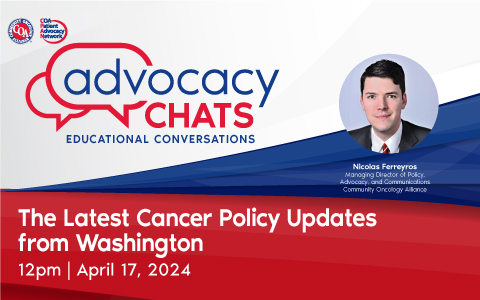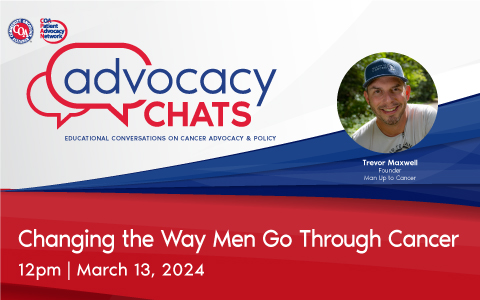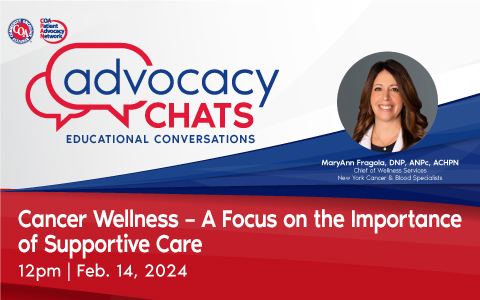Get to Know Your Oncology Care Team: Oncology Social Workers
November 10, 2021 – The Advocacy Chats are a prominent part of the advocacy education plan. This month’s Advocacy Chat, Get to Know Your Cancer Care Team, featured Abra Kelson, a licensed oncology social worker at Northwest Medical Specialties, a community oncology practice in Tacoma, Washington.
This Chat examined the role of the oncology social worker including:
- The role of licensed mental health professionals (oncology social workers) in providing care for cancer patients.
- How oncology social workers assist patients and their families with care planning and decision making.
- How oncology social workers help cancer patients with the additional emotional and mental health needs during COVID.
- How oncology social workers engage with external patient advocacy support organizations.
- Information on supportive counseling and resources available for cancer patients, cancer survivors and caregivers.
The Role of Oncology Social Workers
The oncology social worker is a key part of the oncology care team. Licensed mental health professionals help navigate through the challenges brought on by illness and treatment, providing such services such as:
- Short-term counseling
- Connecting patients, families, and caregivers to community-based resources and supports
- Care planning
- Disability planning

From diagnosis through treatment, survivorship, and end of life, the oncology social worker has special knowledge and training to help manage through the psycho-social aspects of cancer.
Let’s take a deeper look at what these four areas look like.
Patients, Families, Caregivers
The oncology social worker provides comprehensive psychosocial services and programs, through all phases of cancer. This can include addressing the emotional and mental health of patients, their families, and their caregivers; adjusting to such practical matters like diet, special clothing, housing, and transportation; adjusting to role and family dynamic changes; and financial concerns. In addition to emotional and mental support, they can also connect patients to resources and remove barriers to care.
Organizations
Oncology social workers support their practices with a knowledge of the psychosocial, social, cultural, and spiritual factors that impact coping with cancer and its effects to ensure the practice is providing quality psychosocial programs and care. By addressing these needs, the oncology social worker can initiate programs that support a patient’s medical care. It is common to see the oncology social worker initiate different programs and support groups and activities that build a community of support for patients and their loved ones.
Community
The oncology social worker also serves in outreach to the community and works to promote and strengthen the community services, programs, and resources available to meet the needs of cancer survivors. By identifying the existing community support resources, the oncology social worker builds on the existing services, works to advocate for community support, and increase the resources for all cancer survivors and their families.
Rose commented that when she was in treatment, her children were young, and her social worker brought up the subject of meals. Although she was not really eating, her family still needed to eat, and the oncology social worker helped establish a system for family meals. Patients in the midst of treatment, while focused on their cancer, its treatment, and even thoughts that they may die, are also faced with the more mundane aspects of life, such as meal preparation, childcare, and maintaining the family home. This is where an oncology social worker can foresee issues and step in to help maintain the family dynamic during cancer treatment. Because cancer affects not just the patient but also the entire family, there must be resources for the patient and for the family.
Social Work Profession
With advance knowledge through clinical and other research, the oncology social worker can orient, supervise, and evaluate clinical social work in oncology. They also promote student training and professional education in oncology.
Why is the Oncology Social Worker’s Role Important?
Research has shown that there are universal challenges to living with cancer. The most common challenges are:
- Unwanted aloneness
- Financial burden
- Loss of hope
- Loss of control
- Living with uncertainty
The worldwide pandemic has made living with cancer even more difficult and has exacerbated and intensified each of these challenges. Social workers are asking the questions to determine what effect these and other challenges are having on the patient. Newly diagnosed patients will often say that they do not even know what they need or want. The important thing is that they know that when, and if, they identify problems, the oncology social worker is available to help them through each one no matter what those needs are or what they may become.
As oncology patients deal with their cancer, some will find that their disease has isolated them while others may find themselves surrounded by family and friends, yet still feel alone because no one understands what they are experiencing. Often patients are reluctant to discuss what they are going through, their fears, and what they are feeling because they do not want to burden their family or friends. Despite everyone’s best effort, there can be a resulting limit on social support for the patient who does not want to cause others additional stress, sadness, or grief.
Oncology social workers know that limited social support combined with unmanaged distress, untreated depression, and unrecognized grief can make it a challenge to cope with the many changes brought on by a cancer diagnosis and treatment. These feelings of sadness, grief, and anger that people experience can be like an annoyingly large beach ball the impedes and obstructs patients as if they were trying to swim around it in a pool. Getting rid of these feelings can be like continually trying to push that beach ball under water and each time it pops up with increasing force. As the patient tries to keep this ball out of their way, they drain all their energy trying to keep it underwater and get rid of the beach ball. The oncology social worker is trained to come in and work with the patients to find other better ways to deal with these feelings by providing support and connections to resources.
Depression and Cancer
Because of the commonality and frequency of depression among patients with cancer, it is important to highlight the oncology social worker’s role in supporting patients with depression. Facts about depression tell us that:
- Depression is a serious but common mental health condition that affects an estimated 16 million adults in the United States.
- American Cancer Society reports an estimated one in four people with cancer experience depression.
- Depression is common in patients diagnosed with cancer, with the prevalence of depressive disorders as high as 25 percent.
- Depressive disorders in patients with cancer are two to three times more likely than in the general population.
The cancer care team must be sensitive to the increased likelihood of depression.
Depression can have a significant effect on a patient’s physical status. It can affect:
- Cancer outcomes – depression can cause poorer cancer outcomes, increased mortality, poorer medication adherence, impairment to personal health management.
- Frequency of medical visits – patients with depression made 76percent more health care visits, were over twice as likely to have an emergency department visit, 81 percent more likely to be hospitalized, and twice as likely to experience a 30-day hospital readmission, relative to non-depressed patients
- Health care costs – patients with cancer with a depression diagnosis incurred total health care charges that are 113 percent greater than patients with no depression diagnosis.
Along with a patient’s depression comes:
- Fatigue
- Decreased energy
- Difficulty concentrating
- Changes in appetite and sleep
- Feelings of hopelessness and helplessness
- Sadness
Depression makes the activities of daily living more difficult. This can cause patients to put off taking medications or not be motivated to go to treatment appointments. Patients with depression often do not do well with their own personal health management. Some patients will go as far as to struggle with finding a reason or purpose to continue with treatment. The logical consequence can be increased office and hospital visits resulting in an increased cost of care. The oncology social worker is often in the role of assessing for depression and providing intervention. That may be counseling or connecting a patient with a community provider.
Coping Through the Ongoing Pandemic
Let’s go back to the beach ball. Try to think of other ways to deal with this beach ball that represent the combined negative and obnoxious feelings patients may have about having cancer. What would happen if patients just let go of the ball? It would pop up, with force, because the patient has been holding it down. A way to deal with that ball might be to wait for it to float away to a less bothersome place. Another way might be to deflate the ball. To do that one would need to find the valve. The cancer equivalent of finding the valve is to acknowledge the feelings brought on by having cancer and to cry, scream, and express those feelings and experience them fully. This enables patients to let the negative emotions, the beach ball, deflate. That can reduce the power these feelings may have over a patient’s life. What that can also mean is getting additional support and finding additional ways to cope with and minimize the effect of these negative feelings.
Ways to self-manage stress and depression can include:
- Laughter – there are now even classes on laughter yoga, as well as more common methods, such as reading joke books or finding funny movies and books
- Exercising and setting a plan for better nutrition
- Getting social in virtual hangouts like Facetime/Zoom/ House party
- Getting involved
- Engaging in an activity that brings you joy
- Finishing a project you have been putting off
- Taking a break from news and social media
- Finding and joining support groups
- Acknowledging your grief
- Seeking professional support
Depression is a real illness that may require real treatment in addition to these strategies.
National Organizations for Support
Oncology social workers are aware of valuable local and national resources and can direct patients to the best option for them. Among the best known organizations are the American Cancer Society, Cancer Support Community, and CancerCare.

Getting Involved
An effective way to deal with the issues we have discussed today is by getting involved. COA and CPAN are incredible ways for patients to channel their passion and experiences, to serve other patients who may be going through the same things, and to serve the field at large. A cancer diagnosis can often have a way of making patients want to have influence and to become an advocate. CPAN is a good way to be involved and to share that passion. I definitely recommend anyone who has that energy and passion to join CPAN.

In closing, Abra made the offer that for those persons who have additional questions about the role of the social worker as part of the cancer care team, she is happy to be a resource. She can be reached at:
(253) 219-7811
CPAN Advocacy Chats are regular virtual events where a guest speaker is invited to join us to discuss issues important to advocacy and advocates in a 30-minute webinar.
CPAN Advocacy Chats are regular virtual 30-minute educational conversations about cancer advocacy and policy with a guest speaker invited to discuss issues important to patients and advocates. Summaries of previous Advocacy Chats are available on the CPAN website.
Past Advocacy Chats





